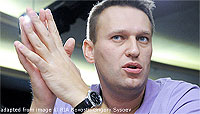Navalny’s catch-22

(Moscow News – Anna Arutunyan, Editor and Correspondent at themoscownews.com – July 22, 2013) For all the Byzantine intrigue behind the decision to let opposition blogger Alexei Navalny go free pending appeals, I was sincerely glad for him, his family and his supporters.
Last Thursday’s ruling, which slapped Navalny with a five-year term in a penal colony, brutally wiped out fledgling hopes (stoked by upcoming mayoral elections for which Navalny is a registered candidate) that a whistleblower facing arcane fraud charges would get off on probation.
That hope was a bit naive in retrospect, but it sure made political sense, for three reasons: one, Navalny could help legitimize Moscow Mayor Sergei Sobyanin by coming in second in a free race; two, the conviction would prevent Navalny from ever holding office; and three, the probation itself would make him more cautious at protest rallies.
This isn’t about politics, though, it’s about raw power. In that light, consider what Navalny said to me last April, before the protest movement lost steam. We were at a rally in support of Oleg Shein – a mayoral candidate in the southern city of Astrakhan – and I had asked Navalny about his own cult-like following. Hipsters were lining up for autographs at the time. Navalny’s following didn’t matter, he told me, because he wasn’t in the Kremlin.
He was right. But he was also right in a sense that he perhaps did not anticipate: it takes a lot more than a free (or “free”) election to propel a man into the Kremlin, or into any position in Russian power.
Navalny, you see, is a great politician. He’s got the charisma, the lawyerly legal know-how, the ability to raise money and support, and – what’s particularly important in the Russian context – the skill of being all things to all people. That’s a skill he shares, by the way, with Vladimir Putin. Navalny’s also got a strong, smart, gorgeous wife and two beautiful kids. If this were America, he’d be president already.
Foreign journalists have been asking me since Navalny’s verdict came in: Is he going to be the next Vaclav Havel, the next Nelson Mandela? My answer is no.
The reason has very little to do with Navalny, and more to do with the fact that a real, free, fair election can’t happen in Russia. Not yet.
Sure, the Kremlin can insist on a free and fair election by the letter of the law, without top-down phone calls to local election committees, judges and municipal officials. But that doesn’t mean the election would be free in spirit: the phone calls may be placed from the bottom-up, as confused officials seek instructions from above. Who are people supposed to vote for? What’s the right answer?
The current mayoral campaign epitomizes this catch-22. Acting Moscow Mayor Sobyanin himself took mind-bogglingly great pains to get Navalny into the race by urging municipal deputies to cast their signatures for the Kremlin critic. If it weren’t for Sobyanin’s orders, Navalny would not have gathered the 110 signatures necessary to register. Navalny’s ratings also picked up to 8 percent thanks, in part, to Sobyanin’s backing.
What does this mean? It means that Navalny’s resurgent popularity comes in no small part through the grace of state power.
What exactly state power is trying to achieve is a different question. Are they grooming Navalny as a mainstream politician? Using him to legitimize the mayor? Humiliating him?
It could be all of the above. But it could also mean that, as sociologist Olga Kryshtanovskaya told me, Putin isn’t actually calling the shots. Rather, despite his orders that government officials use the law to guide their decisions, they still look to him as they try to interpret what he actually wants.
The same goes for elections. When someone in power has to order “free” elections, it kind of diminishes the spirit of freedom, doesn’t it?
There are, as yet, only two methods in a power system like Russia’s for regime change: the endorsement of a candidate by state power itself (and the candidate’s subsequent victory at the polls), or a revolutionary coup.
